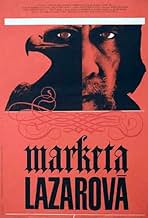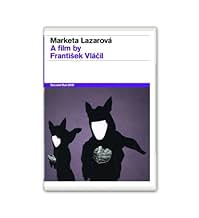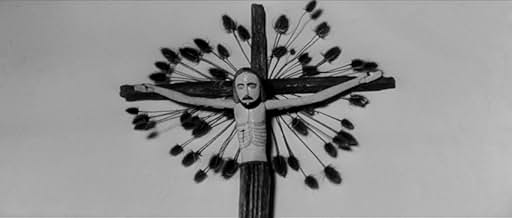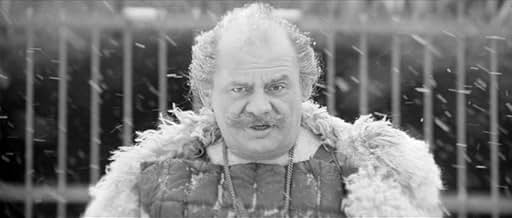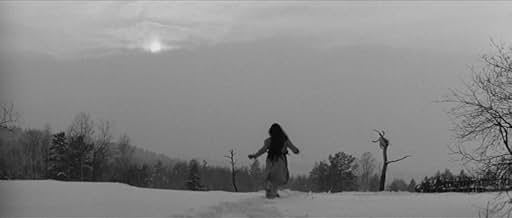IMDb-BEWERTUNG
7,9/10
6225
IHRE BEWERTUNG
Ein unbedeutender tschechischer Clan gerät im Mittelalter in Konflikt mit dem König, zu einer Zeit, zu der das Christentum allmählich das Heidentum ersetzt.Ein unbedeutender tschechischer Clan gerät im Mittelalter in Konflikt mit dem König, zu einer Zeit, zu der das Christentum allmählich das Heidentum ersetzt.Ein unbedeutender tschechischer Clan gerät im Mittelalter in Konflikt mit dem König, zu einer Zeit, zu der das Christentum allmählich das Heidentum ersetzt.
- Auszeichnungen
- 2 Gewinne & 2 Nominierungen insgesamt
Handlung
WUSSTEST DU SCHON:
- WissenswertesFrantisek Vlácil not only had the clothes painstakingly researched and hand-sewn, he had the cast live in the forest for the two years of shooting so they could get into the 13th century mindset.
- PatzerIn a scene where Marketa observes a reindeer in the forest, you can see a director Frantisek Vlácil in jacket in the left of the frame. He was actually trying to scare deer, because they didn't want to move. This could be seen only on some of the Blu-Ray and DVD versions.
- Alternative VersionenThe UK DVD is cut by 3 secs to remove a shot of a snake being stabbed.
- VerbindungenEdited into CzechMate: In Search of Jirí Menzel (2018)
Ausgewählte Rezension
Man was a beast before the Middle Ages, but now it was one racked with guilt. Violence was the constant and would continue to be the shaper of worlds but, with the advent of this new religion preaching mercy and penitence, it was probably the first time that this violence was experienced within unprecedented, new frameworks. What had been passed through the blood for centuries in the Teutonic woods as the only means of arranging the world in some order, this instinctive violence, was now felt to be abominable.
In this sense, the religious angst of the medieval man comes from trying to conciliate that ancestral world where carving a blood eagle on the back of a fallen chieftain pleased the gods, with the new ideas of perceiving it, where sins had to be atoned for.
Here we get the tumultuous chronicle of this, the writing of the middle part of history.
We get baroque, medieval art, steeped in religious terror and ancestral guilt. Chances are there's a slew of medieval films out there, but probably not one that is as pungent, with a single exception. We encounter this cruel, pitiless hell on earth where life is meaningless and crazed gods roaming it exact terrible, ironic tolls on the human soul, ten years later in Diabel, by the hand of a certified madman this time.
Spiritually I couldn't be farther apart from this godless vision of tortured human beings, essentially Christian. But as an experience to dwell upon and inhabit, the film offers no quarter. It's a better Valhalla Rising, thirty years before.
What new frameworks here though, how best to experience the torture of the medieval man? The director finds the answer in the Czech New Wave.
The intertitle that opens this delineates what follows as a saga, an epic story of murder and intrigue. The masterstroke here lies in how this saga is told, in fragmenting it from a linear notion where time is a succession (which is the artifice of history) and presenting us with those fragments as a vivid experience of a life bled for and anguished. Which is to say, Marketa Lazarova is not the history of what transpired but the memory of it, which is then arranged into a story.
The camera then sees inside this story deeper than any bard did. And what it sees is that these passions and sufferings are not linear, therefore building up to something or anticipated to come to an end that would justify the pain, but an exponential cycle turning indifferently and without pattern.
Yet here is where the film falters. Having broken this up, the film shies away from the opportunity to look directly at what hides behind it, if anything, and insists we read this as a rhapsody where it's not impossible to consider the degenerate as cruel, flawed heroes who defied the king's rule. Bombastic music swells up in crescendos now and then to remind us that all this is horrible, but fundamentally tragic.
This may be a quibble however. It's a harrowing experience watching these men, small and insignificant at the face of violence, struggle with a pain and madness immemorial, that predates their existence. Omens of skaldic doom abound here, black crows in the bony branches of trees. Whatever they signify or not, whether the gods cackle at all this or are indifferently absent, these sights curdle the blood.
In this sense, the religious angst of the medieval man comes from trying to conciliate that ancestral world where carving a blood eagle on the back of a fallen chieftain pleased the gods, with the new ideas of perceiving it, where sins had to be atoned for.
Here we get the tumultuous chronicle of this, the writing of the middle part of history.
We get baroque, medieval art, steeped in religious terror and ancestral guilt. Chances are there's a slew of medieval films out there, but probably not one that is as pungent, with a single exception. We encounter this cruel, pitiless hell on earth where life is meaningless and crazed gods roaming it exact terrible, ironic tolls on the human soul, ten years later in Diabel, by the hand of a certified madman this time.
Spiritually I couldn't be farther apart from this godless vision of tortured human beings, essentially Christian. But as an experience to dwell upon and inhabit, the film offers no quarter. It's a better Valhalla Rising, thirty years before.
What new frameworks here though, how best to experience the torture of the medieval man? The director finds the answer in the Czech New Wave.
The intertitle that opens this delineates what follows as a saga, an epic story of murder and intrigue. The masterstroke here lies in how this saga is told, in fragmenting it from a linear notion where time is a succession (which is the artifice of history) and presenting us with those fragments as a vivid experience of a life bled for and anguished. Which is to say, Marketa Lazarova is not the history of what transpired but the memory of it, which is then arranged into a story.
The camera then sees inside this story deeper than any bard did. And what it sees is that these passions and sufferings are not linear, therefore building up to something or anticipated to come to an end that would justify the pain, but an exponential cycle turning indifferently and without pattern.
Yet here is where the film falters. Having broken this up, the film shies away from the opportunity to look directly at what hides behind it, if anything, and insists we read this as a rhapsody where it's not impossible to consider the degenerate as cruel, flawed heroes who defied the king's rule. Bombastic music swells up in crescendos now and then to remind us that all this is horrible, but fundamentally tragic.
This may be a quibble however. It's a harrowing experience watching these men, small and insignificant at the face of violence, struggle with a pain and madness immemorial, that predates their existence. Omens of skaldic doom abound here, black crows in the bony branches of trees. Whatever they signify or not, whether the gods cackle at all this or are indifferently absent, these sights curdle the blood.
- chaos-rampant
- 1. Mai 2011
- Permalink
Top-Auswahl
Melde dich zum Bewerten an und greife auf die Watchlist für personalisierte Empfehlungen zu.
- How long is Marketa Lazarová?Powered by Alexa
Details
- Laufzeit2 Stunden 42 Minuten
- Farbe
- Sound-Mix
- Seitenverhältnis
- 2.35 : 1
Zu dieser Seite beitragen
Bearbeitung vorschlagen oder fehlenden Inhalt hinzufügen

Oberste Lücke
By what name was Marketa Lazarova (1967) officially released in India in English?
Antwort
![Trailer [OV] ansehen](https://m.media-amazon.com/images/M/MV5BOGZhMmFmMGQtNGZhMi00M2QzLWExMjItZjJkZTVhMmEzYzJjXkEyXkFqcGdeQXRyYW5zY29kZS13b3JrZmxvdw@@._V1_QL75_UX500_CR0)
